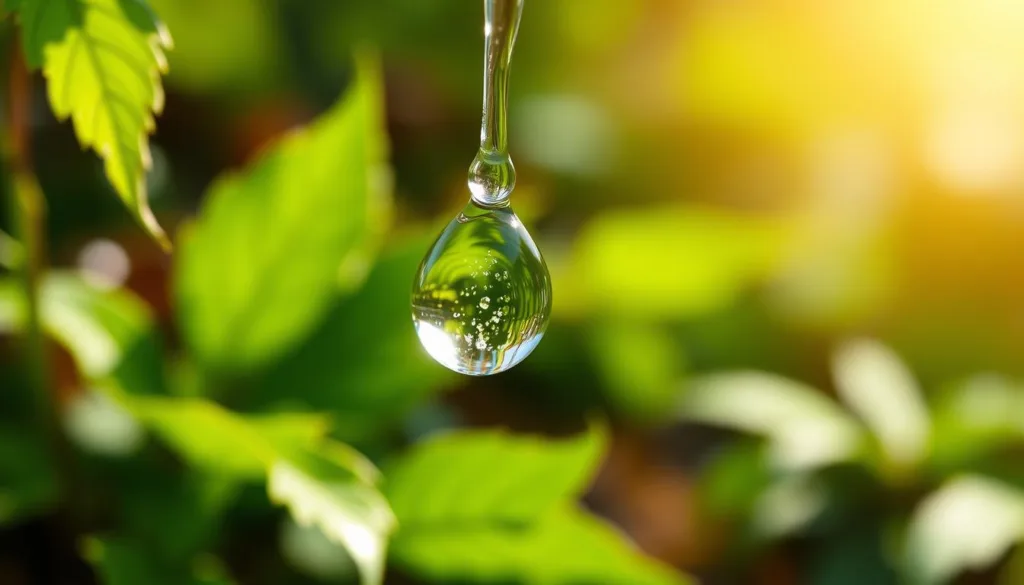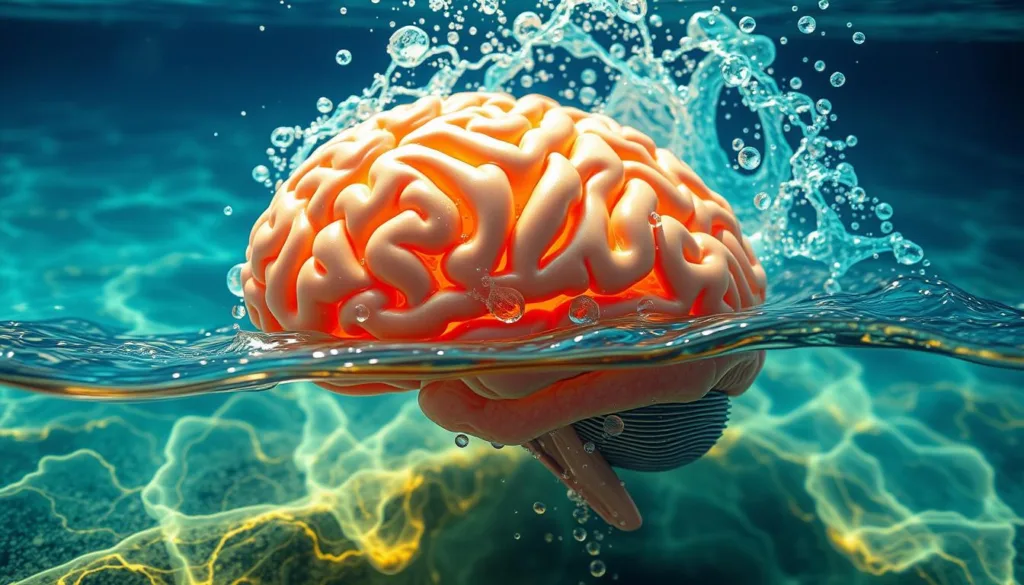Table of Contents
Do you often feel moody, foggy, or unfocused? The secret to better mental health and wellness might be as simple as drinking enough water. Explore the strong link between hydration and your wellbeing in this detailed guide.

It’s well-known that “water is life.” Our brains, made up of about 75% water, need it to function well. But hydration does more than just sharpen your mind. It also helps balance your mood, reduce stress, and support your emotional health.
Understanding the Basics of Body Hydration
Staying hydrated is essential for maintaining good health. Adults are about 60% water, which is vital for many body functions. Drinking enough water helps with digestion, nutrient absorption, and keeping your body temperature right.
It also helps your brain work better. This is important for thinking clearly and staying focused.
The Science Behind Water Balance
Water is essential for many body functions. It helps with digestion, keeps joints healthy, and supports the digestive system. It also helps your heart pump blood better and your muscles work well.
Inadequate water intake can lead to issues such as dizziness and headaches. In extreme cases, it can even be dangerous, like heat stroke.
Daily Hydration Requirements
The U.S. National Academies say women need about 2.7 liters of water a day. Men need about 3.7 liters. But, how much you need can change based on several factors.
Things like how active you are, where you live, your health, and what you eat can affect your water needs.
Factors Affecting Hydration Needs
- Climate and environmental conditions: People in hot or humid places need more water.
- Physical activity: Those who exercise a lot or sweat a lot need to drink more.
- Health conditions: Some health issues, like diabetes, can change how much water you need.
- Age and body composition: Older people and those with more body fat might need different amounts of water.
Drinking enough water is important all the time, not just when you’re active. It helps your brain, digestion, and kidneys work well. It also helps with your weight and keeps your skin healthy.

The Brain-Water Connection: Neural Function and Fluid Balance
Keeping the brain hydrated is key for its best performance. Water makes up about 75% of the brain’s weight. It’s vital for many brain functions, like making neurotransmitters and controlling blood flow.
Drinking enough water helps the brain send signals well. It’s needed for making neurotransmitters like serotonin and dopamine. These chemicals help with mood, emotions, and thinking. Even a little dehydration can hurt attention, focus, and memory.
Dehydration can also cut down blood flow to the brain. This means less nutrients and oxygen and more waste. It can cause tiredness, headaches, and lower brain function. But, drinking enough water helps the brain work better by delivering nutrients and removing waste.
To keep your brain healthy, drink at least 8 cups (2 liters) of water a day. This can change based on where you live, how active you are, and your personal needs. Eating foods high in water, like watermelon and oranges, also helps.

By focusing on brain hydration, you can improve your focus, memory, and thinking skills. Remember, staying hydrated is not just for your body. It’s also crucial for your brain’s health and performance.
Hydration and Mental Health: Direct Correlations
Drinking enough water is key for good mental health. It affects how our brain works, including mood and stress levels. This is because water helps our brain chemicals and how we feel.
Impact on Neurotransmitter Function
Neurotransmitters like serotonin and dopamine control our mood and motivation. Drinking enough water helps our brain make these chemicals. But, not drinking enough can upset their balance, leading to mood swings and anxiety.
Effects on Mood Regulation
Drinking water keeps our emotions stable and our mood positive. Research shows that not drinking enough water can make us feel anxious and stressed. Drinking enough water, however, can make us feel happier and more relaxed.
Stress Response and Water Balance
Drinking enough water is important for handling stress. Not drinking enough can make our stress hormone levels go up, making us feel anxious. Drinking enough water helps our body handle stress better, making us more resilient.
How Dehydration Affects Cognitive Performance
Staying hydrated is crucial for maintaining brain health. Research shows that even a little dehydration can hurt how well you think.
A study on young women found that losing just 1.36% of fluids after exercise made them feel worse. They had lower moods and concentration, and more headaches. Men also suffered, with 1.59% dehydration affecting their memory and making them feel anxious and tired.
Dehydration makes it hard to focus, understand things, and make good choices. It can lower your cognitive impairment, making you less sharp mentally. Staying hydrated is vital for top brain performance.
Knowing how dehydration affects your brain helps you stay hydrated. Drinking enough water is a simple way to keep your brain healthy. It boosts your productivity and overall well-being.
Mental Health Symptoms Related to Poor Hydration
Keeping your body hydrated is key for both physical and mental health. Dehydration can cause symptoms that harm your mood and mind. Knowing these signs helps you see why drinking enough water is vital.
Physical Warning Signs
Dehydration’s physical signs can warn of mental health issues. Feeling thirsty, dark urine, tiredness, and headaches are common. These signs can hint at problems in your mind and feelings.
Emotional and Psychological Indicators
Dehydration affects your mood and mind too. It can make you feel distracted, irritable, anxious, and moody. These issues come from dehydration’s impact on brain chemicals and fluid balance.
Behavioral Changes
Dehydration can change how you act. You might feel less productive, stressed, and patient. You could also be less open to feedback and help others less than when you’re hydrated.
It’s important to notice these signs of dehydration’s impact on mental health. Drinking enough water helps your brain, emotions, and behavior. This supports your mental health and improves your life quality.
The Role of Water Quality in Mental Wellness
Keeping our minds healthy is key to feeling good. Research shows that the water we drink might affect our mental state. A study in BMC Medicine found links between trace elements in water and higher anxiety and depression risks.
The study had 24,285 participants. It found that drinking water with manganese, iron, and aluminum could lead to more anxiety. It also showed that what we eat can change how these elements affect our mental health.
- A 1 standard deviation increase in manganese exposure reduced the incidence of depression by 8%.
- With a 1 standard deviation increase in copper and cadmium exposure, the incidence of depression increased by 6% and 8% respectively.
- The incidence of anxiety increased by 39%, 33%, and 14% respectively for a 1 standard deviation increase in manganese, iron, and selenium exposure.
Good drinking water is vital for our mental health. Tap water often has lead and chlorine, which can harm our brains and lead to anxiety and depression.
Using a water filter to clean tap water can protect our mental health. It helps us think clearer and focus better. Getting a quality water filter, like those from ZeroWater, is a smart move for our well-being.
Water quality and mental health are closely linked. This is a big deal for public health. By learning about the link between hydration and mental health, we can make better choices for our minds.
Strategies for Maintaining Optimal Hydration
Staying hydrated is key for your health. Adding good hydration habits to your day can really help. Start with a glass of water in the morning. Keep a water bottle handy all day to drink more often. Use phone reminders to stay on track.
Daily Hydration Routines
Make a daily plan to drink more water. Here are some easy steps:
- Kickstart your day with a glass of water.
- Keep a water bottle handy and sip from it consistently.
- Set reminders to drink water every few hours.
- Eat water-rich foods like fruits and vegetables
- Incorporate electrolyte-rich drinks to replenish after physical activity
Creative Ways to Increase Water Intake
Don’t like plain water? Try adding lemon, lime, or cucumber for flavor. Sparkling water or herbal teas can also spice up your routine. Make drinking water fun by making it your own.
Tracking Methods and Tools
Keep track of your water to make sure you drink enough. Try using a water tracking app or a smart water bottle. Check your urine color to see if you’re drinking enough.
With these tips, you can stay hydrated and feel great. Use these strategies and tools to keep your body well-hydrated.
Environmental and Lifestyle Factors Affecting Hydration Status
Keeping your body hydrated is key to feeling good. But, many things around you and your daily habits can affect how well you stay hydrated. Knowing what these are can help you drink the right amount of water and keep your mind healthy.
Where you live is a big factor. People in hot or humid places need to drink more water to stay balanced. How active you are also matters. Working out or spending time outside makes you sweat more, losing water.
What you eat also plays a part. Eating foods with lots of water, like fruits and veggies, helps you stay hydrated. But, eating too much salt or sugar can make you lose more water and get dehydrated.
Certain health conditions or medications can affect your water intake needs. For example, people with diabetes or kidney disease might need to drink more water. Some medicines, like diuretics, can also make you lose more water.
Even your social and economic status can affect how well you stay hydrated. People with lower incomes might drink water with more heavy metals, which can harm your mental health and overall well-being.
Key Environmental and Lifestyle Factors Affecting Hydration:
- Climate and temperature
- Physical activity level
- Diet and nutrient intake
- Health conditions and medications
- Socioeconomic status and water quality
By knowing these factors, you can take steps to stay hydrated and support your mental health. Drinking enough water, eating well, and staying active can all help you feel better and stay well.
Conclusion
Drinking enough water is key to keeping your mind and body healthy. A study by Brio Water showed 79% of Americans think their lives would get better with more water. Drinking water can make you more productive, confident, and nicer to others.
Water is vital for your brain to work well and for your mood. Drinking enough water helps you focus better, feel less stressed, and be emotionally well. It also helps your body stay healthy, with good skin, weight, and recovery from exercise.
Making water a priority is a simple but powerful move towards a better life. By knowing how important water is and adding it to your daily routine, you can improve your mental health and wellbeing. Let water be your ally and see how it can change your life for the better.
FAQ
What is the connection between hydration and mental health?
Drinking enough water is key for a healthy brain and mood. It helps make and send important brain chemicals like serotonin and dopamine. These chemicals help us feel good or bad. Not drinking enough can mess with these chemicals, causing mood swings and feelings of sadness or worry.
How does dehydration affect cognitive performance?
Even a little dehydration can hurt how well we think and remember. It can make it hard to focus and make decisions. This is because it reduces blood flow to the brain, which is needed for energy and thinking.
What are the physical, emotional, and behavioral signs of dehydration?
Signs of dehydration include feeling thirsty, dark urine, tiredness, and headaches. It can also make you feel moody, anxious, or have trouble concentrating. You might feel less productive or have less patience.
How does the quality of drinking water impact mental health?
Research links certain chemicals in water to anxiety. Drinking water with too much manganese, iron, or aluminum can harm your mental health. This shows why clean water is important for our mental wellbeing.
What are effective strategies for maintaining optimal hydration?
Good ways to stay hydrated include drinking water first thing in the morning and carrying a bottle. You can also set reminders, eat foods with lots of water, add electrolytes, and track how much you drink. Making water more fun by adding fruit or using cool bottles can help you drink more often.
How do environmental and lifestyle factors affect hydration status?
Many things can affect how well you stay hydrated. These include the weather, how active you are, what you eat, and some health issues. People who are very active or live in hot places need more water. Your social status can also play a role, as those with less money might be exposed to more harmful chemicals in their water.
Looking to prioritize your mental well-being? Visit our Mental Health category for insightful articles, practical tips, and resources to support your journey to a healthier mind.

